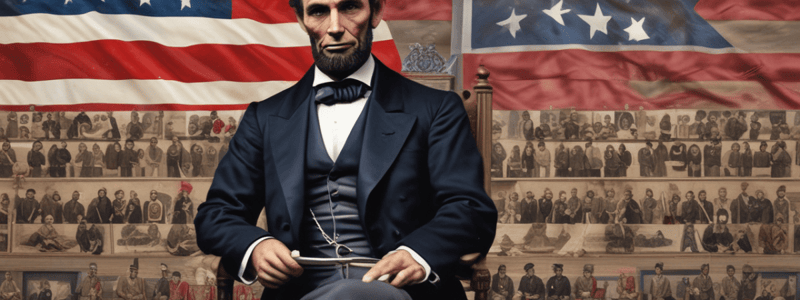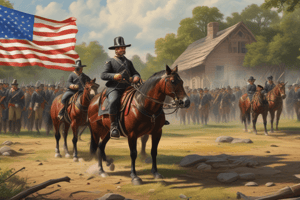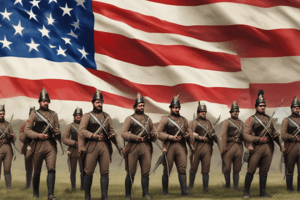Podcast
Questions and Answers
What was the capital of the Confederate States of America?
What was the capital of the Confederate States of America?
- Charleston, SC
- Atlanta, GA
- Richmond, VA (correct)
- Washington, D.C.
Which event is considered the start of the Civil War?
Which event is considered the start of the Civil War?
- The Battle of Bull Run
- Lincoln's inauguration as President
- The firing on Fort Sumter (correct)
- The secession of South Carolina
What was the South's main advantage at the start of the Civil War?
What was the South's main advantage at the start of the Civil War?
- Superior population and industrial capacity
- Control of the Mississippi River
- More miles of railroad tracks
- Home field and better trained soldiers (correct)
What was the Anaconda Plan?
What was the Anaconda Plan?
What did President Lincoln do regarding habeas corpus?
What did President Lincoln do regarding habeas corpus?
Who was the President of the Confederate States of America?
Who was the President of the Confederate States of America?
Which Union general is credited with capturing Robert E. Lee and ending the Civil War?
Which Union general is credited with capturing Robert E. Lee and ending the Civil War?
What was the Union's strategy for splitting the Confederacy in the Anaconda Plan?
What was the Union's strategy for splitting the Confederacy in the Anaconda Plan?
Who was the 16th President of the United States and led the Union forces during the Civil War?
Who was the 16th President of the United States and led the Union forces during the Civil War?
What was the North's main advantage over the South in the Civil War?
What was the North's main advantage over the South in the Civil War?
What action by the South led to the official start of the Civil War?
What action by the South led to the official start of the Civil War?
What was one of the advantages of the South at the beginning of the Civil War?
What was one of the advantages of the South at the beginning of the Civil War?
What was one of the North's strategies in the Anaconda Plan during the Civil War?
What was one of the North's strategies in the Anaconda Plan during the Civil War?
Why did President Lincoln suspend Habeas Corpus during the Civil War?
Why did President Lincoln suspend Habeas Corpus during the Civil War?
Which event marked the official beginning of the American Civil War?
Which event marked the official beginning of the American Civil War?
What was Lincoln's approach towards enforcing the blockade on Southern ports during the Civil War?
What was Lincoln's approach towards enforcing the blockade on Southern ports during the Civil War?
Which advantage did Ulysses S. Grant utilize effectively during his command in the Civil War?
Which advantage did Ulysses S. Grant utilize effectively during his command in the Civil War?
How did Lincoln use Habeas Corpus suspension to maintain order during the Civil War?
How did Lincoln use Habeas Corpus suspension to maintain order during the Civil War?
What event marked the bloodiest day in U.S. history during the Civil War?
What event marked the bloodiest day in U.S. history during the Civil War?
Which Union general was involved in an easy victory for Lee at the Battle of Fredericksburg?
Which Union general was involved in an easy victory for Lee at the Battle of Fredericksburg?
In which battle did General Grant's forces force a Confederate retreat and help capture the Mississippi River?
In which battle did General Grant's forces force a Confederate retreat and help capture the Mississippi River?
Which naval officer captured New Orleans during the Civil War?
Which naval officer captured New Orleans during the Civil War?
During the Battle of Antietam, how many troops did General McClellan command compared to Lee?
During the Battle of Antietam, how many troops did General McClellan command compared to Lee?
Which type of boats were used in the Battle of 2 Bulls Run?
Which type of boats were used in the Battle of 2 Bulls Run?
What was the significance of the Emancipation Proclamation issued by Lincoln on January 1, 1863?
What was the significance of the Emancipation Proclamation issued by Lincoln on January 1, 1863?
What consequence did the Battle of Gettysburg have on the Confederate Army led by Lee?
What consequence did the Battle of Gettysburg have on the Confederate Army led by Lee?
What strategic advantage did Grant gain for the Union after the Battle of Vicksburg?
What strategic advantage did Grant gain for the Union after the Battle of Vicksburg?
Why did President Lincoln promote Grant to the position of Union General?
Why did President Lincoln promote Grant to the position of Union General?
What was a notable feature of Sherman's March to the Sea during the Civil War?
What was a notable feature of Sherman's March to the Sea during the Civil War?
Who is known for founding the American Red Cross during and after the Civil War?
Who is known for founding the American Red Cross during and after the Civil War?
What statement best describes Lincoln's Second Inaugural Address in 1865?
What statement best describes Lincoln's Second Inaugural Address in 1865?
What did Lincoln aim to achieve by issuing the Emancipation Proclamation during the Civil War?
What did Lincoln aim to achieve by issuing the Emancipation Proclamation during the Civil War?
Study Notes
The American Civil War
- The Confederate States of America had its capital in Richmond, VA, with Jefferson Davis as President.
- The war began on April 1861 when the South fired on Fort Sumter, a Federal fort in South Carolina, after President Lincoln tried to resupply the fort.
- The South had advantages such as home field, close supplies, superior generals, and better-trained soldiers.
- The North had advantages like a larger population (2 million compared to 900,000), more industrialization, more factories, and more railroad tracks.
The Anaconda Plan
- The Anaconda Plan was a three-part strategy by the North:
- Blockade all Southern ports to prevent trade and supplies from other countries.
- Split the Confederacy in half along the Mississippi River.
- Capture Richmond, the capital of the South.
Key Events and Battles
- The Battle of Bull Run (First Manassas) was an easy victory for the South.
- The Battle of Shiloh (1862) saw Grant force a Confederate retreat, capturing the Mississippi River.
- The Battle of New Orleans (1862) was won by Admiral Farragut.
- The Battle of Fredericksburg was an easy victory for the South.
- The Battle of Antietam (September 17, 1862) was the bloodiest day in U.S. history, resulting in 26,000 deaths.
- The Emancipation Proclamation (January 1, 1863) freed all slaves in rebelling territory, ensuring Great Britain did not join the war.
Turning Point Battles (1863)
- The Battle of Chancellorsville saw a Confederate victory, but at the cost of Jackson's life.
- The Battle of Gettysburg (July 1-3, 1863) was a Union victory, with 51,000 deaths in three days, making it the bloodiest battle of the war.
- The Battle of Vicksburg saw Grant capture the fort, controlling the Mississippi River.
The End of the Civil War
- Sherman's March to the Sea saw the destruction of Atlanta and its industrial and transportation centers.
- Lincoln's Second Inaugural Address (1865) emphasized the need to welcome the South back into the Union.
- The Civil War ended with Lee's surrender at Appomattox Courthouse on April 9, 1865.
Studying That Suits You
Use AI to generate personalized quizzes and flashcards to suit your learning preferences.
Description
Test your knowledge on the key events and decisions leading to the outbreak of the American Civil War, including the Confederate States of America's actions, Federal fort conflicts, and Abraham Lincoln's responses.




